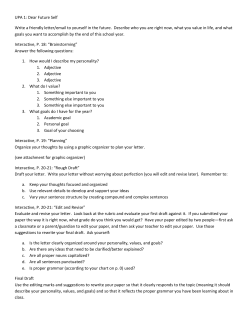
Ben Young
1 Ben Young Tom the Sociopath Lord Voldemort is a prime example of sociopathy. In short, a sociopath is a person who lacks any feelings of empathy for others (Antisocial Personality 1). Many of Voldemort’s sociopathic traits can be seen most clearly in scenes that show him as a child. He is repeatedly shown to be capable of being very charismatic when he wants to be, he is exceptionally independent and intelligent, other characters specifically state that he cannot understand or feel love, and he often manipulates and lies to others. A prominent feature of a sociopath is an abundance of charisma (Antisocial Personality 1). Sociopaths are often very capable of getting other people to like them. In particular they are often highly skilled at hiding the fact that they simply don’t care about other people. Voldemort, of course was very successful at hiding his true personality from others when he was young. Short of showing more of himself than he intended in his first encounter with Dumbledore in his excitement at discovering that he was a wizard, it is quite likely no one, except perhaps those who would become the first Death Eaters, truly knew anything of the young Tom Riddle’s thoughts and goals until he emerged as Lord Voldemort and began his attack on Magical Britain. In school Voldemort apparently put his talents to use primarily by manipulating teachers, as seen in the scene in which he asks Professor Slughorn about Horcruxes “What with your uncanny ability to know things you shouldn’t, 2 and your careful flattery of the people who matter…I confidently expect you to rise to Minister of Magic within twenty years” (Prince, 495). Seeing as Professor Slughorn has made his life goal essentially the manipulation of people who matter, this is high praise of Voldemort’s persuasive capabilities indeed. Like many sociopaths, Voldemort was also a very effective and chronic liar (Antisocial Personality 1). This, in combination with his charisma made him very effective at getting information adults were unwilling to share with him as a child and teenager. As an adult he made extensive use of these abilities to ensure the loyalty of his followers. Voldemort’s talent for lying and manipulation were in particular put to good use in his first job out of Hogwarts, working at Borgin and Burkes. “Voldemort was sent to persuade people to part with their treasures for sale by the partners, and he was, by all accounts, unusually gifted at doing this” (Prince 433). With clients like Hepzibah Smith, Voldemort made effective use of flattery to get what he needed. Voldemort also displays remarkable independence, even as an 11 year old child. When told that he would be accompanied to purchase his school things at Diagon Alley Voldemort immediately responded “I don’t need you. I’m used to doing things for myself, I go around London on my own all the time” (Prince 274). This independent streak extends into his school years, where though he gathers a number of followers, Dumbledore notes “Riddle undoubtedly felt no affection for any of them” (Prince 361). As an adult Voldemort only becomes more detached from the help of other people, he refuses to confide in anyone the existence of his Horcruxes, he trusts no one to help him discover why Harry’s wand counters his so effectively, and when he believes his Horcruxes are in danger he checks the 3 status of each one personally. Sociopaths generally socialize only as a means of control or way to appear normal (Antisocial Personality 1). As a child, Voldemort shows one of the early warning signs of a dangerous sociopath; cruelty towards animals (Antisocial Personality 1). During his time at the orphanage it seems Voldemort forced a child’s pet bunny to hang itself from the ceiling. “Billy Stubbs’s rabbit…well, Tom said he didn’t do it and I don’t see how he could have done, but even so, it didn’t hang itself from the rafters, did it?” (Prince 267). For a normal child the sounds of the bunny suffering would likely be a somewhat traumatic event, but Voldemort shows no signs of remorse, suggesting that he is not capable of appreciating what the animal is feeling. Both as a child and as an adult Voldemort shows a lack of respect for other people’s property (Antisocial Personality 1). As a child in the orphanage he steals the possessions of the other children. As an adult he claims historical relics of the Hogwarts founders for his own use as Horcruxes. As Harry thinks after learning that Helena Ravenclaw had told Voldemort where to find her mother’s lost Diadem, “Tom Riddle would certainly have understood Helena Ravenclaw’s desire to possess fabulous objects to which she had little right” (Hallows 617). Even when he was young Voldemort was already demonstrating that hurting other people was nothing worth avoiding to his mind, as Mrs. Cole told Dumbledore “well, Amy Benson and Dennis Bishop were never quite right afterwards, and all we ever got out of them was that they’d gone into a cave with Tom Riddle. He swore they’d just gone exploring but something happened in there, I’m sure of it” (Prince 268). Obviously this willingness to hurt people only increased as he got older, though Voldemort was not free to unleash this 4 urge entirely until he was safely out of school, and out from under the watchful eye of Dumbledore. A significant trait of a sociopath is the inability to accurately judge the potential costs of an action, and properly weigh it against the benefits, leading to impulsive behavior (Antisocial Personality 1). When Voldemort asks Professor Slughorn what he knows about Horcruxes he is told “well, you must understand that the soul is supposed to remain intact and whole. Splitting it is an act of violation, it is against nature” (Prince 497-498). This warning is immediately disregarded by Voldemort, who in fact immediately asks “would one Horcrux be of much use? Can you only split your soul once? Wouldn’t it be better, make you stronger, to have your soul in more pieces, I mean, for instance, isn’t seven the most powerfully magical number, wouldn’t seven -?” (Prince 498). Dumbledore even mentions on several occasions that Voldemort simply has not considered what the value is of having a complete, undamaged soul. This same inability to weigh risk and reward is also tied to the fact that many sociopaths have difficulty with long-term planning. However, those sociopaths who are capable of looking into the future for their plans, also tend to be more intelligent than those who cannot (Antisocial Personality 1). Voldemort, of course, had to have some ability to plan things in order to set up the creation of his Horcruxes, and establish the more formal organization of the Death Eaters. It is worth noting that throughout Voldemort’s over 70 years of life, not once is it so much as hinted at that he had romantic, or even sexual feelings for another human being. If one were willing to do some speculation, they might arrive at the notion that Bellatrix Lestrange’s undying devotion may have been a sign that she had such feelings for 5 Voldemort, but it is likely he only saw her as a powerful witch, who was intensely devoted to him and his cause. Unfortunately for her, the narration for Voldemort’s reaction to her death implies that this is true. “(Harry) saw McGonagall, Kingsley, and Slughorn blasted backward, flailing and writhing through the air, as Voldemort’s fury at the fall of his last, best lieutenant exploded with the force of a bomb” (Hallows 737). The narration gives the implication that Voldemort cares that Bellatrix has died primarily because of her magical abilities, not any personal liking or relationship. As mentioned before, sociopaths do not form personal relationships because they actually like or care about the other person, but because it gets them some benefit. It is no mistake that the main villain of Harry Potter also happens to be a textbook sociopath. Perhaps the most prominent theme of the series is the power and goodness of love, so it is highly appropriate that the ultimate evil is a creature that not only cannot feel love, but is incapable of feeling any empathy for others at all. The circumstances of Voldemort’s birth are also of interest regarding the theme of love. Merope and Tom Riddle Sr.’s relationship is not one based on mutual love, rather only Merope is in love, and she magically forces Riddle Sr. to love her for a time. It is appropriate then, that the result of their union is a sociopath, a person who cannot love others, only himself. In the end, the last challenge Voldemort is given, and the only thing that could have saved him, was simply to show remorse, in other words, empathy for those he had hurt. Unfortunately, for him, this is one challenge that is truly impossible. 6 Works Cited "Antisocial Personality -- Part I." Harvard Mental Health Letter 17.6 (2000): 1. Academic Search Complete. Web. 16 Apr. 2013. J.K. Rowling. Harry Potter and the Deathly Hallows. New York. Arthur A. Levine books (Scholastics). 2007. J.K. Rowling. Harry Potter and the Half Blood Prince. New York. Arthur A. Levine books (Scholastics). 2005.
© Copyright 2025











